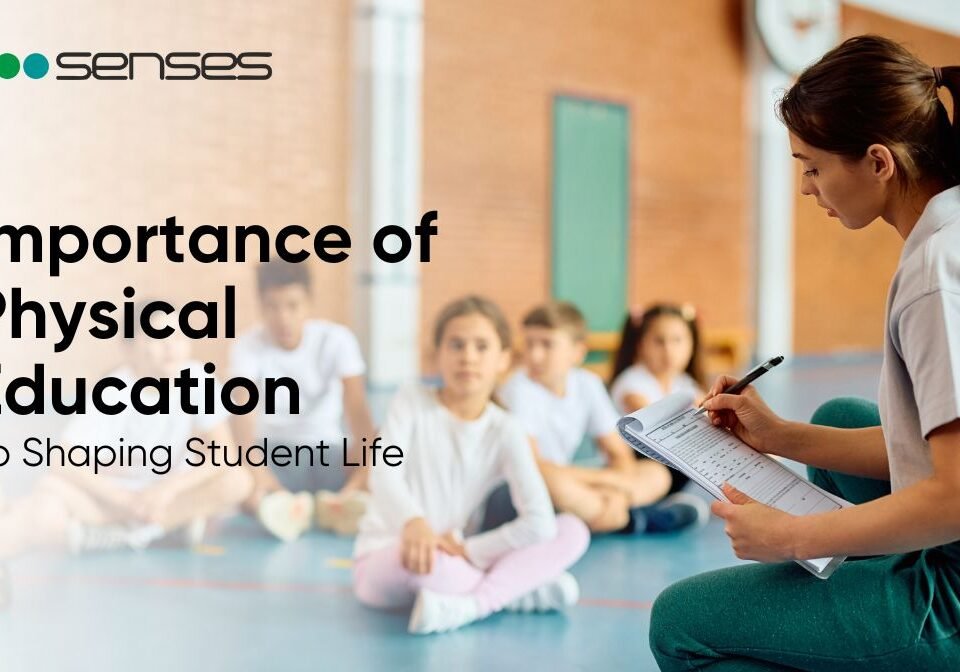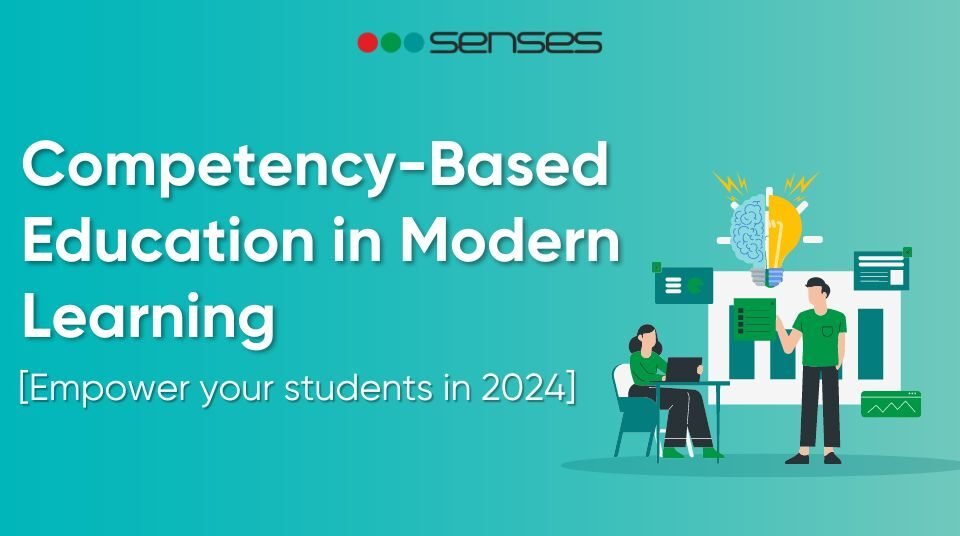New National Education Policy 2023:
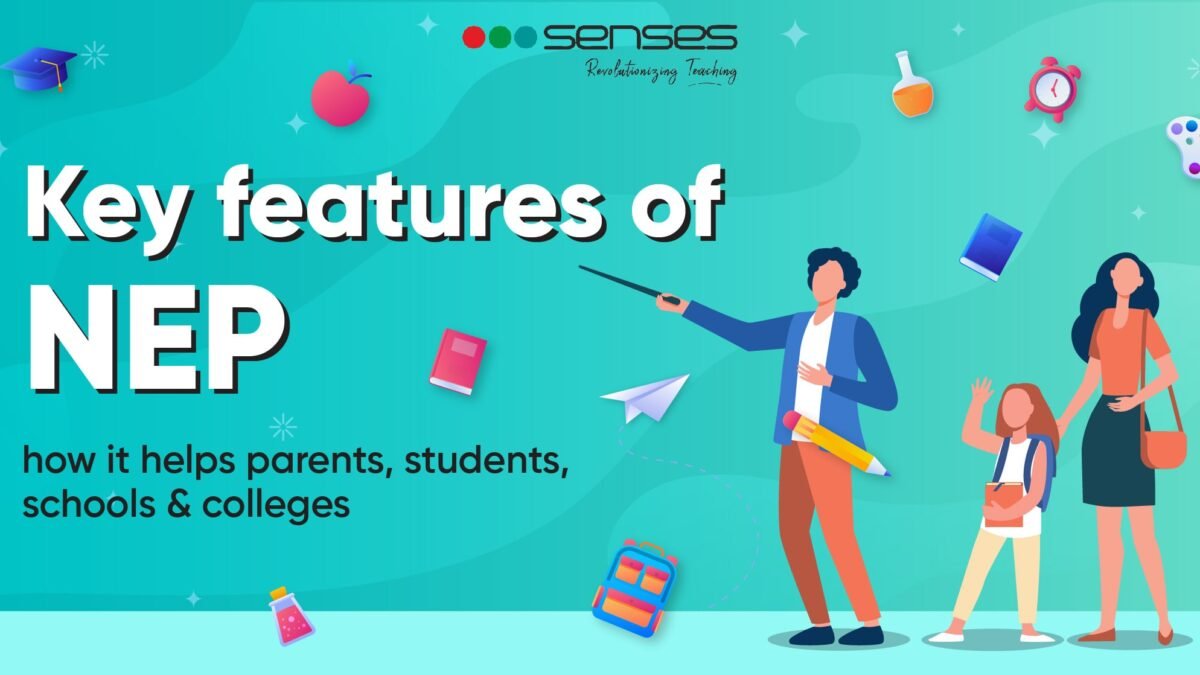
Education is a fundamental right. It is a key necessity for every child to shape a better future.
The first National Policy on Education was introduced in 1968 by former Prime Minister Indira Gandhi. Since then, there have been significant revisions. The former Prime minister introduced the revised policy in 1986. Following this, PM Narendra Modi introduced the National Education Policy in 2020. It came into existence during the academic year of 2023-24, thereby becoming popular as the NEP 2023.
This blog explores the NEP 2023, its main features, policies for teachers and more.
List of Contents:
- What is the National Education Policy 2023?
- Main Features of the National Education Policy
- Policies for Teachers
- What Parents Should Know
- Conclusion
What is the New National Education Policy 2023?
The National Education Policy was proposed and approved by the Union Cabinet on 29 July 2020. It was implemented in the academic year of 2023-24, and thus, it is known as the New Education Policy 2023.
Its primary objective is to make education more holistic, inclusive and flexible. It focuses on the rapidly growing changes in the knowledge landscape and providing an inclusive and equitable education to all children by 2030.

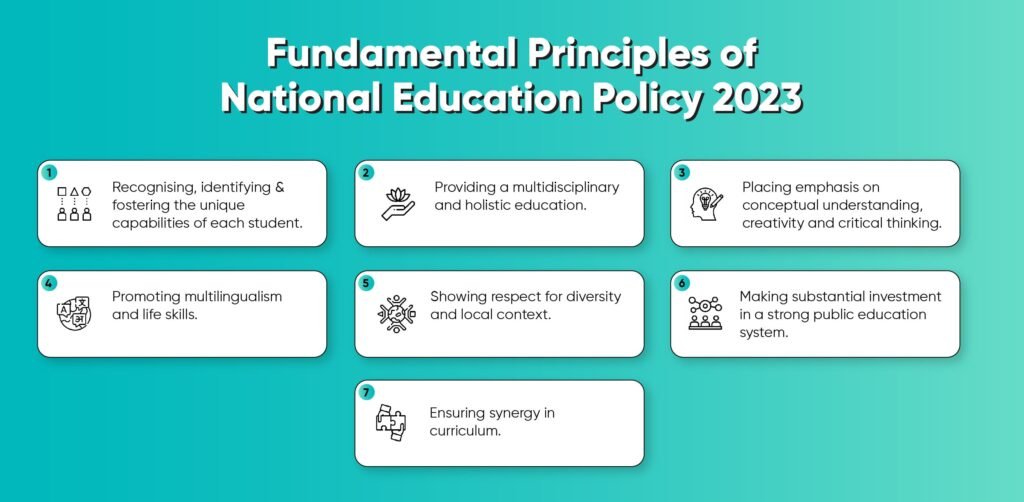
Vision:
The NEP 2023 envisions an education policy that aims to transform India into an impartial and vibrant knowledge society. This can be done by providing high-quality education to all, thereby making India a global superpower.
The curriculum must foster a deep sense of respect for the nation’s fundamental rights and duties. It also seeks to instil pride in being Indian through spirit, intellect, and action.
Main Features of the National Education Policy 2023
The National Education Policy is built on the pillars of:
- Affordability
- Access
- Accountability
- Quality
- Equity
The NEP 2023 has identified some of the major challenges within the existing education system. It aims to overcome these challenges and focuses on strengthening the existing system. Additionally, it seeks to address and improve various aspects of the education system, from early childhood to higher education.

Let us examine some of the main features of the National Education Policy 2023:
1. 5+3+3+4 Structure
The 10+2 structure will be replaced by the 5+3+3+4 structure. This corresponds to the ages of 3 to 8, 8 to 11, 11 to 14, and 14 to 18.
This system will consist of 12 years of schooling and 3 years of Anganwadi/early education.
It will cover 4 stages:
Stage 1: Foundational Stage- Anganwadi/preschool + Grades 1 and 2 in primary school (covering ages 3 to 8)
Stage 2: Preparatory Stage- Grade 3 to Grade 5 (covering ages 8 to 11)
Stage 3: Middle stage- Grade 6 to Grade 8 (covering ages 11 to 14)
Stage 4: Secondary Stage- Grade 9 to Grade 12 (covering ages 14 to 18)
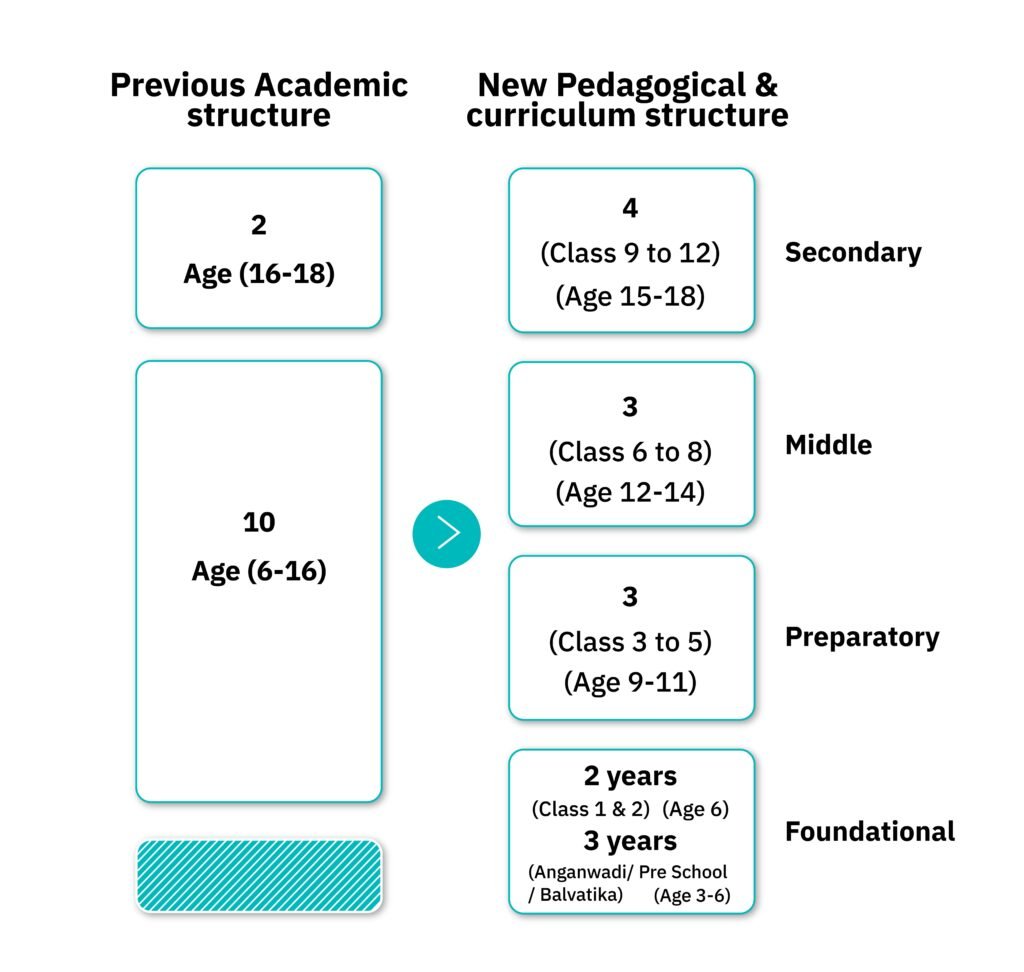
This curriculum will aim for holistic development and the enhancement of critical thinking and experiential learning.
2. Early Education
According to the NEP 2020 report, about 85% of a child’s brain development occurs by the age of 6.

Early Childhood Care and Education (ECCE) consists of activity-based and play-based learning, which includes numbers, alphabets, colours, shapes, etc. It also focuses on inculcating good behaviour, ethics, problem-solving, teamwork, and much more.
A National Curricular and Pedagogical Framework for ECCE will be developed for children up to the age of 8 by NCERT. It will be in two parts: a sub-framework for 0 to 3-year-olds and another sub-framework for 3 to 8-year-olds. Poetry, games, story-telling, songs, etc., will be included.
The overall goal is to ensure that all children have access to high-quality ECCE across the country. To this end, well-constructed Anganwadi centres with high-quality infrastructure, playing equipment and well-trained teachers will be established.
ECCE will also be introduced in Ashrams in tribal areas.
The Ministry of Education will ensure that prime attention is given to the foundational learning of children.
3. Primary and Secondary School Education
The National Education Policy envisions universal access to education for children from pre-primary to Grade 12. It also aims to achieve a 100% enrollment ratio by 2030.
Some of the initiatives include improved infrastructure, innovative education centres, among others.
It also aims to make the curriculum holistic, focusing on 21st-century skills and experiential learning. There will be no separations for Arts and Science, or extracurricular activities. Vocational and academic streams will not be separated. The overall objective is to give equal importance to all subjects- be it arts, social science, maths, etc.
The NEP 2023 also emphasised promoting multilingualism. Wherever possible, studies will be taught in the mother tongue or local/regional language- preferably till the 8th grade or at least till the 5th grade. Foreign languages such as Korean, German, French, Japanese, etc., will be offered in secondary school. Indian Sign Language (ISL) will also be standardised across the country for children with hearing impairments.
The National Education Policy will also ensure that special attention is given to Socially and Economically Disadvantaged Groups (SEDGs) so that no child misses out on the opportunity to get educated regardless of circumstances.
It also aims to ensure that at least 50% of students in secondary and higher education get exposure to vocational learning. Students from grades 6-12 should get an opportunity to intern in vocational subjects through online as well as offline activities.
Special emphasis will also be given to children with disabilities and gifted children.
4. Higher Education
The National Education Policy aims to increase the Gross Enrollment Ratio of higher education to 50% by 2035 as it currently stands only at 26.3%.
It envisions a multi-disciplinary and all-inclusive education for undergraduates. It also aims to give them exposure to arts, humanities, sciences, etc., and create multiple entry and exit points.
An undergraduate degree will be of 3 or 4 years with multiple exit points will be provided during this time. Appropriate certifications, such as a diploma for completing 2 years and a degree certificate for completing 3 years will be given. The 4-year multidisciplinary Bachelor’s programme shall be preferred, as it allows the opportunity to experience holistic education. This will be achieved with a focus on major and minor subjects chosen by the students according to their preferences.
Multidisciplinary Education and Research Universities (MERUs) will be set up. This will aim to achieve the highest standards for multidisciplinary education all across India.
5. Digital Education
Given the recent pandemic, special emphasis must be given to online/digital education. This ensures that schools and colleges are prepared with alternative mediums of education, in case in-person education is not possible.
New Education Policy 2023 recognises the importance of integrating technology in education and acknowledges its potential risk. Existing digital platforms and ICT areas must be updated to meet current and future needs.
As teachers face numerous challenges in conducting online classes and exams, they must be trained accordingly.
Public digital infrastructure should be improved to prevent it from becoming outdated.

Policies for Teachers in the New Education Policy 2023
Teachers help students shape the future of our nation. NEP 2023 aims to empower teachers and inspire many others to enter the teaching profession.
A large number of merit-based scholarships will be provided to individuals across the country, especially in rural areas, for studying a 4-year B.Ed programme. Additional incentives and local housing provisions will be given to teachers who take up teaching positions in rural areas.
Teacher Eligibility Tests (TETs) will include improved test material in terms of content and schooling. For subject teachers, suitable TET or NTA test scores in the chosen subjects will also be considered for recruitment.
Teacher-requirement planning will be conducted by each state to assess subject-wise teacher vacancies over the next two decades. This will be technology-based.
The primary goal will be to maximise teachers’ ability to do their jobs effectively. Teachers will not be engaged in work that is not directly associated with teaching. They will not be involved with administrative tasks and will fully focus on children’s learning.
Teachers will be given various opportunities for self-improvement and to learn the latest innovations in their professions. This will be done through regular workshops and online development modules. Teachers will be expected to invest at least 50 hours in Continuous Professional Development (CPD).
Teachers with excellent performance and work will be recognised and rewarded through salary increases and incentives. This is based on peer review, attendance, CPD hours, etc.
NEP 2023 also ensures that there will be opportunities for career growth for all teachers.
There will be specialisations and certificate courses for special education as well.
What Every Parent Should Know about National Education Policy 2023
The Indian Government has taken a significant step by replacing the 34-year National Policy of Education (1986) with the New Education Policy 2023.
Here are a few key highlights that parents should be aware of:
- The 10+2 framework is being replaced by the 5+3+3+4 model.
- Vocational education will begin in 6th grade and will include internships.
- The separation of different streams will be eliminated. Children can opt for any subject they wish across all disciplines.
Parents are crucial parts of a child’s educational ecosystem. They oversee their children’s performance. As a result, it is essential for you to be informed about new and upcoming policies to ensure that high standards of education are met. You also need to ensure that your child’s education aligns with the new policies.
To Wrap it Up!
The National Education Policy has taken a significant leap forward with the intention of transforming education in India. The government aims to make education more inclusive and accessible.
By prioritising access, equity, and quality- the New Education Policy 2023 promotes a more inclusive and dynamic education system.
The National Education Policy is expected to be fully implemented by 2040 which will be done through the coordination of the central and state governments.
For an in-depth understanding of NEP, you can have a look at the document uploaded by the UGC and the Ministry of Education on their respective websites.


